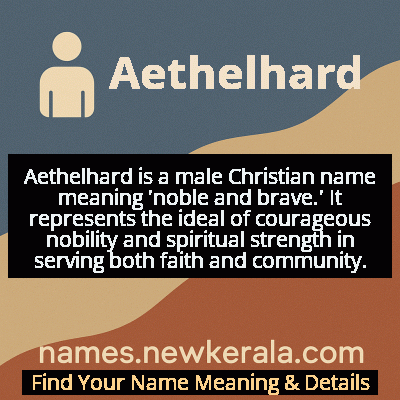Aethelhard Name Meaning & Details
Origin, Popularity, Numerology Analysis & Name Meaning of Aethelhard
Discover the origin, meaning, and cultural significance of the name AETHELHARD. Delve into its historical roots and explore the lasting impact it has had on communities and traditions.
Name
Aethelhard
Gender
Male
Origin
Christian
Lucky Number
1
Meaning of the Name - Aethelhard
Aethelhard is a male Christian name meaning 'noble and brave.' It represents the ideal of courageous nobility and spiritual strength in serving both faith and community.
Aethelhard - Complete Numerology Analysis
Your Numerology Number
Based on Pythagorean Numerology System
Ruling Planet
Sun
Positive Nature
Leaders, ambitious, highly driven, self-reliant, innovative.
Negative Traits
Overly aggressive, domineering, impatient, selfish.
Lucky Colours
Red, orange, gold.
Lucky Days
Sunday.
Lucky Stones
Ruby, garnet.
Harmony Numbers
2, 3, 9.
Best Suited Professions
Entrepreneurs, managers, engineers.
What People Like About You
Courage, determination, leadership.
Famous People Named Aethelhard
Aethelhard of Winchester
Bishop
Defended Christian communities during Viking invasions
Aethelhard of Canterbury
Archbishop
Maintained church authority during political instability
Aethelhard the Warrior
Military Leader
Legendary defender of Saxon settlements
Name Variations & International Equivalents
Click on blue names to explore their detailed meanings. Gray names with will be available soon.
Cultural & Historical Significance
The name gained particular prominence during the Viking Age when Christian communities needed leaders who could provide both spiritual guidance and physical protection. Several bishops and religious leaders bore this name, embodying the ideal of the 'soldier of Christ' who defended both faith and community. This dual significance made Aethelhard a powerful symbolic name during times of invasion and religious conflict, representing the Christian ideal of noble courage in service to both God and people.
Extended Personality Analysis
Individuals named Aethelhard are typically perceived as possessing strong leadership qualities combined with deep moral conviction. They tend to be principled, courageous, and protective, often taking on roles where they can defend or guide others. Their noble bearing comes not from arrogance but from a genuine sense of responsibility and commitment to higher ideals. These individuals usually demonstrate remarkable resilience in adversity and maintain their composure under pressure, making them natural leaders in challenging situations.
Aethelhards often exhibit a blend of traditional values and progressive thinking, honoring heritage while embracing necessary change. They are typically reliable, steadfast, and possess strong integrity, making others naturally trust and respect them. While they can be somewhat serious and focused, they also show deep loyalty to family and community. Their courage is not merely physical but extends to moral and intellectual bravery, willing to stand for what is right even when unpopular. This combination of noble character and hard resilience makes them particularly effective in roles requiring both strength and wisdom.
Modern Usage & Popularity
In contemporary times, Aethelhard is considered a rare and distinctive name, primarily used by parents interested in Anglo-Saxon history or seeking unique traditional names with strong meaning. It appears occasionally in historical reenactment communities, among families with English heritage, and in academic circles focused on medieval studies. The name has seen a slight resurgence with growing interest in Old English names and Viking Age history, though it remains uncommon compared to more mainstream Anglo-Saxon names like Alfred or Edward. Modern usage often involves shortening to 'Aethel' or 'Hardy' for everyday convenience while preserving the full name's historical gravitas.
Symbolic & Spiritual Meanings
Symbolically, Aethelhard represents the ideal of noble courage—the combination of high birth or character with unwavering strength. It embodies the concept of righteous strength, where power is exercised with moral responsibility and protection of the vulnerable. The name carries connotations of spiritual warfare in the Christian tradition, representing the battle against sin and evil through faith and virtue. It also symbolizes the bridge between ancient warrior traditions and Christian morality, embodying the transformation of physical courage into spiritual fortitude and the protection of community through both faith and action.

